 Do you want to track the effectiveness of your social media marketing?
Do you want to track the effectiveness of your social media marketing?
Wondering which social media tactics are paying off?
By defining and tracking a few key data points, you can determine whether your marketing is on target.
In this article, you'll discover seven social media metrics to help you gauge your marketing's effectiveness.
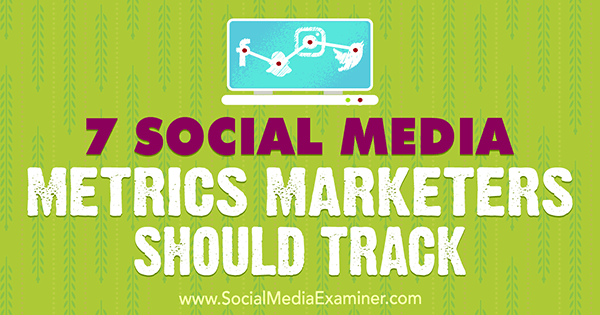
#1: Assess Discoverability via Mentions and Inbound Links
How can you make sure the right people discover you on social media? One way is via your posts. The more your content is dispersed and distributed, the more your business shines and the easier it is for your target audience to find you. If your follower and fan metrics are increasing, your reach is increasing too.
Your total number of followers or fans is only the initial metric, though. You also need to measure the value of your relationships with followers as seen through their interactions with you. Look at the number of mentions or tags. Do people respond to your posts, share your content, or talk about you?
The number of mentions corresponds with the number of times someone has mentioned your business. This happens in different ways on different social platforms. Perhaps someone replied on Instagram or Twitter using your tag (@SpeedQueenHome, for example). When someone responds to or interacts with your shared content, there's often a mention.

Users, fans, and followers can also mention you in their own social posts and comments outside of your content.

If your audience isn't mentioning you online, perhaps the content you're sharing isn't resonating with them. Consider running a few split tests with your audience before you choose which messages to proliferate.
While every industry is different, your social media efforts should yield some results such as mentions. If you have a very small following and several mentions, your content and presence are relevant but you need to look into some audience growth strategies.
If you have a huge following but few interactions and mentions, either your content isn't relevant or you've run ad campaigns that have attracted ill-targeted followers and they're not doing you any good. Again, the solution is to invest time and energy into growing your audience.
After you view the number of mentions, you can use a host of third-party tools or Google Search Console to take a look at the number of inbound links. Inbound links show how many times people are linking back to your website or blog. From an SEO perspective, you're building both authority and discoverability when others share your content.
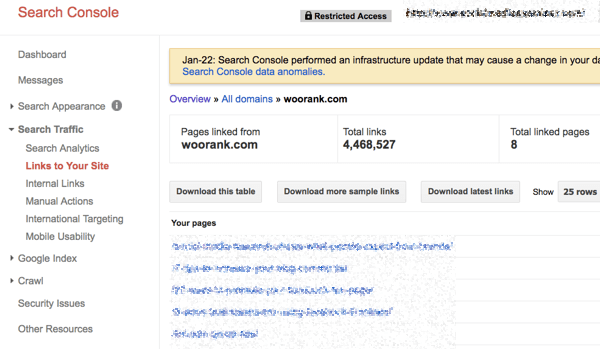
#2: Evaluate Engagement From Audience Interaction
How likely is your audience to share your content? When your followers and fans feel motivated to spread your message, your engagement can increase exponentially.
Get World-Class Marketing Training — All Year Long!
Are you facing doubt, uncertainty, or overwhelm? The Social Media Marketing Society can help.
Each month, you’ll receive training from trusted marketing experts, covering everything from AI to organic social marketing. When you join, you’ll also get immediate access to:
- A library of 100+ marketing trainings
- A community of like-minded marketers
- Monthly online community meetups
- Relevant news and trends updates
You'll find engagement levels through different metrics in your social media insights. Engagement can be in the form of retweets, forwards to a friend, comments, likes, shares, and inbound links.

You'll also want to look at your traffic from social media in Google Analytics. Click on Acquisition > All Traffic > Channels. You must set your dimension to Social to see the full social report based on the channel. From this report, you'll be able to determine which social network is your best traffic source.
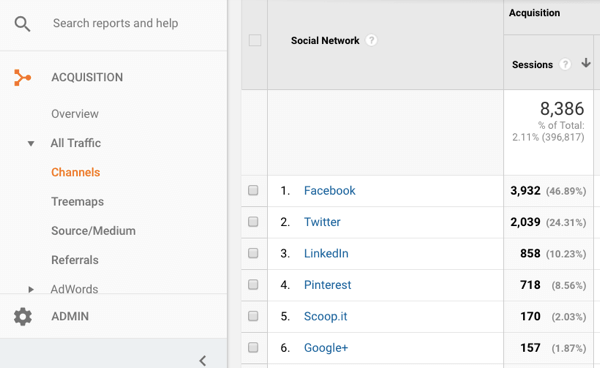
By analyzing the conversion rates on all of your social channels, you can determine what types of content to promote on each channel. This data gives you a better understanding of how you can publish more on popular topics.
#3: Measure the Impact of Influencer Marketing
If you're looking to amplify your reach and engagement on social media, consider bringing in influencers. Look for influencers who have developed a following that's relevant to your business. Influencers aren't competitors, but they're reaching the very target market you want to touch.
For example, you could bring influencers to your brick-and-mortar business and have them post about it, or offer them your product for free in return for a shout-out on social media (and possibly their blog, Yelp, etc.).

Discover Proven Marketing Strategies and Tips
Want to go even deeper with your marketing? Check out the Social Media Marketing Podcast! Publishing weekly since 2012, the Social Media Marketing Podcast helps you navigate the constantly changing marketing jungle, with expert interviews from marketing pros.
But don’t let the name fool you. This show is about a lot more than just social media marketing. With over 600 episodes and millions of downloads each year, this show has been a trusted source for marketers for well over a decade.
So how do you measure the effectiveness of influencer marketing? By understanding the number of brand evangelists and advocates you have, and how they're helping you grow.
The first step in building an influencer marketing strategy is to search for influencers who will deliver the most value. A good tool for influencer research is BuzzSumo. You can then use tools like Traackr and GroupHigh to help you maintain relationships with the influencers you've identified with BuzzSumo.
It's important to know what conversations are being shared with your audience. You also want to know what network is bringing in the most shares. Use unique UTM codes for each influencer to help determine which are driving the most traffic for you.
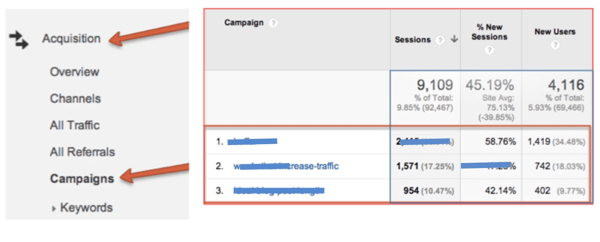
#4: Gauge Sentiment via Your Net Promoter Score and Audience Surveys
Do you know how your target audience feels about your content and your brand in general? Is the sentiment positive? Or does your content need improvement?
The net promoter score (NPS) helps you gauge the sentiment of your audience. To calculate your NPS, survey your customers with the following question: On a scale of 0 to 10, with 10 being highest, what's the likelihood that you would recommend us (our company) to a friend or colleague? You can use the NPS Calculator to get an idea of how your brand is measuring up.
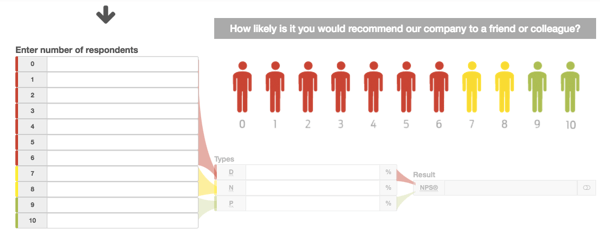
A tool like Mention will also help you gain insight into how your audience feels about your brand. You can see how others view your brand and measure brand sentiment.
Once you know the sentiment of your audience, develop a series of surveys to understand the sentiment on each social network. Try using 6 different surveys with a sample size of 250 or more on each network to get an average of your best-performing networks. The surveys will let you see how engaged the audience is with your current content and identify areas you can improve.
The goal is to measure the sentiment for each network.
#5: Examine Internal Engagement
Is internal engagement just as important as external engagement? Most teams believe it's all about building and growing your audience. But how can an audience be passionate about what you do if your team doesn't set the bar?
Dynamic Signal is a great tool to gauge your employees' interest in the content you share.
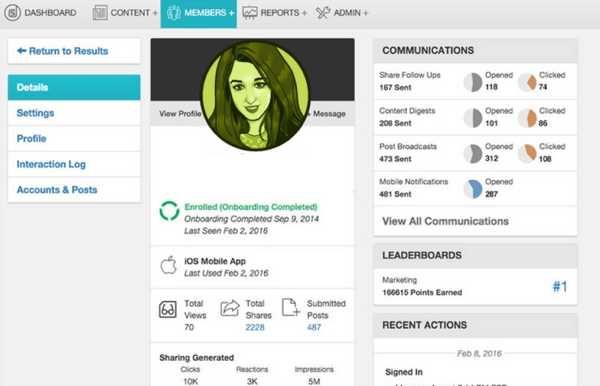
You can measure your spending against your goals and KPIs. The most effective content assets for measurement include blog posts, ebooks, videos, and presentations.
#6: Calculate Conversions From Your Social Channels
Start measuring the conversions from your social media efforts to see if they're paying off. Conversions include subscription metrics, registered users, and the number of leads from your social media channels. You also need to understand the conversion rate from the social network to the lead.
Which social networks are converting the most leads? What's the rate they're converting leads? You can use Google Analytics to determine your conversion rates.
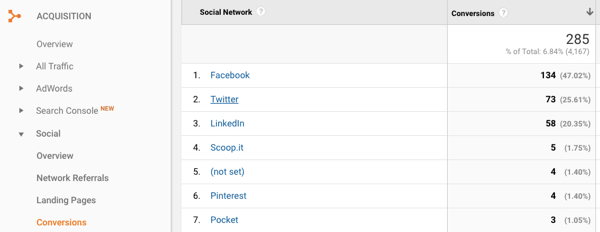
#7: Determine the ROI of Your Social Media
At the end of the day, the big question is how many sales are you generating from your social media marketing? What's the cost per lead?
If you set up UTM URLs for each action, you'll be able to view the metrics you need to understand which programs are paying off and which programs need improvement.
You can use a single-touch attribution model, which allows you to see if the lead came in from a single source of social media. This can be in the form of first touch or last touch. What was the lead's first activity with you? What was their last activity?
If you use the multi-touch model, you'll be able to determine if the lead came in from multiple sources.
For example, suppose users do a Google search for your site and then see two social posts on Facebook. Next, they decide to go on Twitter to download your latest ebook, which they then purchased. This would give 40% of the weight to Google and the ebook and 20% credit to the two social posts on Facebook.
Determine which model is best for your business and understand how social media is impacting revenue within the organization.
Conclusion
In your efforts to become a shining star on social media, you'll need to pay attention to these seven metrics. Each one gives you insight into your accomplishments. Together, they empower you and your business to continue on the path to creating a relevant brand presence with a positive ROI.
What do you think? What other metrics do you track to assess your social media marketing? Please share your thoughts in the comments below.
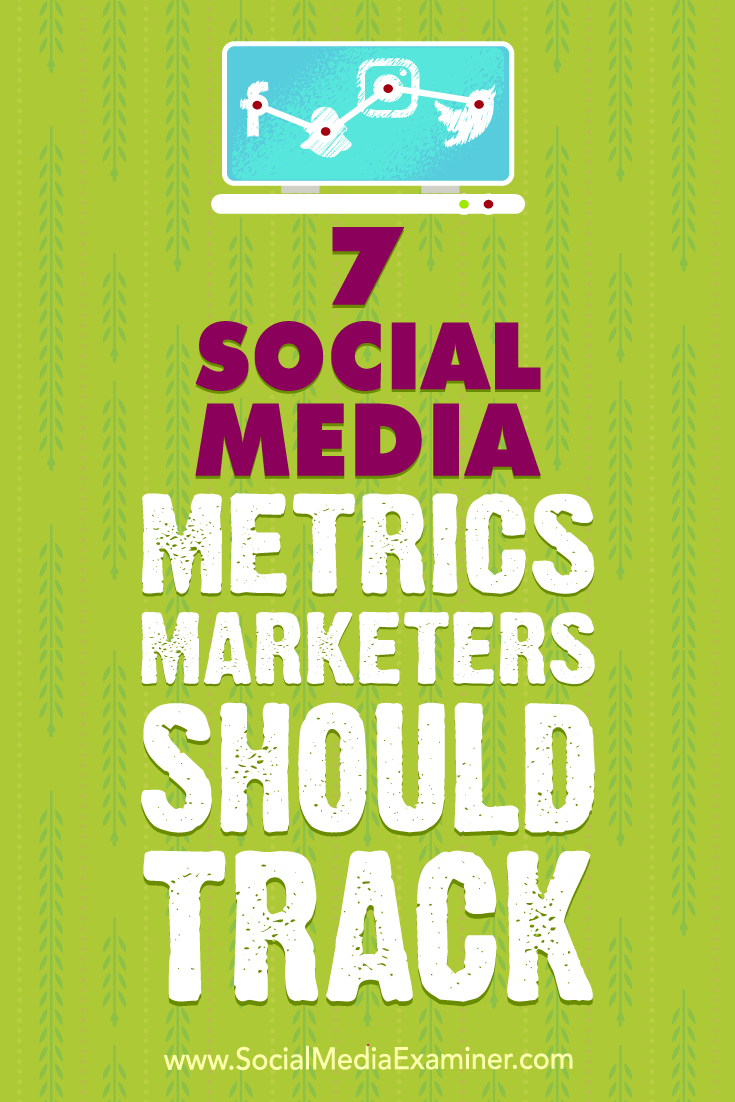
Attention Agency Owners, Brand Marketers, and Consultants

Introducing the Marketing Agency Show–our newest podcast designed to explore the struggles of agency marketers.
Join show host and agency owner, Brooke Sellas, as she interviews agency marketers and digs deep into their biggest challenges. Explore topics like navigating rough economic times, leveraging AI, service diversification, client acquisition, and much more.
Just pull up your favorite podcast app, search for Marketing Agency Show and start listening. Or click the button below for more information.

